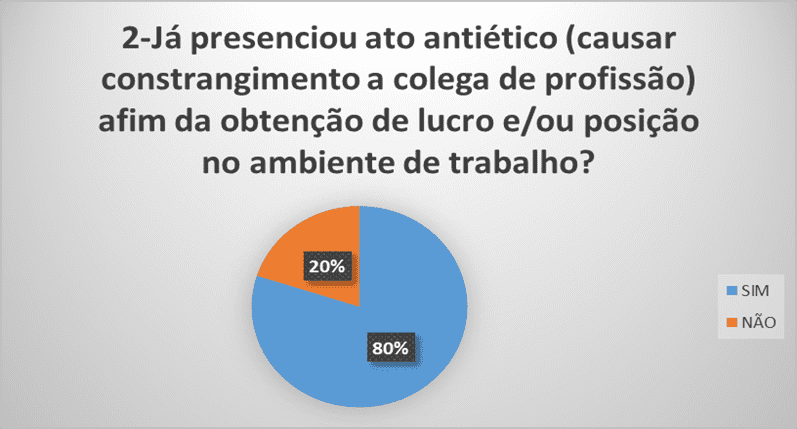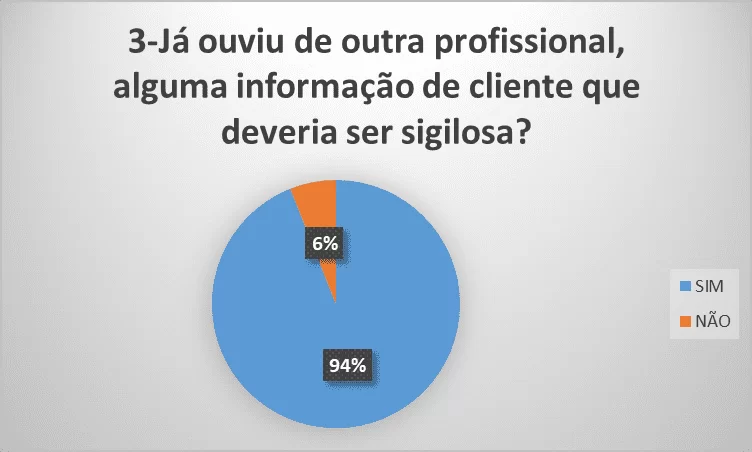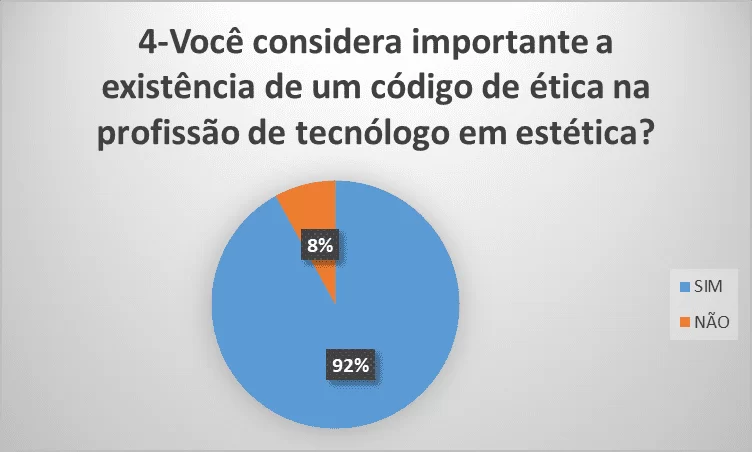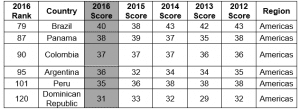REVIEW ARTICLE
GOES, Patrícia de Campos [1], BARRETO, Larissa Cerqueira Cardoso [2]
GOES, Patrícia de Campos. BARRETO, Larissa Cerqueira Cardoso. The importance of professional ethics of the aesthetician in the relationship with the client. Revista Científica Multidisciplinar Núcleo do Conhecimento. 04 year, Ed. 07, Vol. 13, pp. 153-172. July 2019. ISSN: 2448-0959
SUMMARY
The present work aims to demonstrate the importance of professional ethics of the aesthetician in the relationship with the client. To demonstrate the importance of acting ethically, we discuss the concepts of ethics and morals, about the excellence of ethical conduct in the main contexts that guide the workplace of the technologist in aesthetics and cosmetics, and how important is the existence Of the Code of Ethics for this Professional category, as it is a document that specifies, in addition to the rights and duties, which is ethically veted to the practice of the profession and possible punishments in the event of disobedience to what is determined therein. The methodology used was divided into two phases, the first being a bibliographic research, where scientific and literary works solidified the theoretical foundation, and the second, a quantitative survey by means of a questionnaire applied to students of Aesthetic and Cosmetic course at Tiradentes University, working in the area. The answers obtained in the questionnaire indicated that, although most admit the importance of the code of ethics, some interviewees, by choice, still have unethical attitudes. On the other hand, most of them have witnessed acts practiced by professionals who do not conform to ethics.
Keywords: ethics, professional ethics, ethics in aesthetics.
1. INTRODUCTION
During the academic course of the aesthetic student, several theoretical and practical disciplines are presented in order to make it intellectually and technically trained to exercise with property and safety the profession. However, a good professional needs, besides the knowledge about the countless procedures that the profession allows them to be carried out, to possess awareness and reflection regarding the ethical values both in direct contact with the client, as in Work environment, biosecurity, commercial context and professional secrecy (BATAGLIA and BORTOLANZA, 2012).
In Brazil, the Ministry of Education – MEC, formally suggested, in 1992, the inclusion of the discipline of ethics in the curricula of some undergraduate courses, highlighting the relevance of the development of an ethical posture in future professionals of Different areas of knowledge (ARRUDA, RAMOS, 2003, Apud, OLIVEIRA et al. 2010).
Ethics is indispensable to the professional since “doing so”, which relates to the competence for the practice of the profession and “the action”, which relates to professional conduct, are interconnected. Because it is based on a philosophy of values compatible with nature and the end of every human being, the “action” of the human person is conditioned to the basic assumptions “what is” the Man and “for which he lives”. Thus, technical or scientific training needs to be in communion with the Essential ethical principles (MOTTA, 1984).
Every ethical being thinks before acting, and acts knowing that it will have to take the results (CHAUI, 2000). Thus, the aesthetic professional is responsible for the consequences of attitudes that may come to confront the values imposed by society or to harm the client. Ethics is intrinsically linked to the notion of individual autonomy (MAY apud SOUZA, ARAÚJO, 2015). Acting ethically, the intellectually qualified professional can provide the client with technical and emotional security in the execution of the procedures.
In order to answer the problem for this present work, namely, the reason why the professional ethics of the beautician is important in the relationship with the client, we have as hypothesis the need of the beautician to possess, besides the knowledge Technical and intellectual, ethics in the exercise of the profession in order to perform with professionalism its activities, whose relevance are the various cases of procedures that, due to disrespect to ethical conducts, has provoked material and physical damage to Client. This research has as general objective, to identify with students of the aesthetic course acting in the area, the perception of ethics in the practice of the profession. To serve it, it is necessary to describe the concepts of ethics and morals, demonstrate the ethics in professional conduct, anamnesis and information to the client, in biosecurity, in the commercial context, in professional secrecy and on the code of Ethics, as well as To analyze the responses obtained by the selected population.
2. THEORETICAL FOUNDATION
This chapter focuses on showing the theoretical framework that sustains the objective of the study. The conceptual definition of ethics, its relationship with morals, its applications in the context of aesthetics, as well as the importance of the creation of a code of ethics for the beauticists will be brought into the baila.
2.1 ETHICS X MORAL
The ethical and moral terms are often used as synonyms causing confusion and hindering communication and the elaboration of the thought of those who need to use them (PEDRO, 2014). Despite the confusion, the terms are quite different. Ethics, which derives from the Greek ethos, means the character of the individual in society, and moral, which derives from the Latin morale, means custom or set of rules acquired over time (BARROS, 2010).
While ethics are merged into three prerequisites: perception of conflicts (consciousness); Autonomy (condition of positioning itself in an active and autonomous way enters reason and emotion); and coherence, morals presupposes three characteristics: their values are not questioned; Their values are imposed; and disobedience to the rules presupposes punishment (COHEN, SEGRE, 1995). In short, ethics are the good actions freely and spontaneously of the person, and moral is a mandatory set of norms governing human conduct (RICOEUR, 1990).
2.2 ETHICS IN PROFESSIONAL CONDUCT
A good professional must, in addition to having technical and legal knowledge about the procedures that it can be performed and being strictly complying with the care regarding biosafety, dressing appropriately, avoiding costumes incompatible with the Work environment and possess polite and gentle behavior with the client and other people who, continuously or sporadic, attend the site.
Regarding the welcoming and treatment of the client, it is of paramount importance that zeal and respect are present in all attitudes. The Assocemsp (Association of Cosmetology Professionals aesthetic and makeup of the state of São Paulo), in its code of ethics, enumerates in the sections I to III of art. 7 °, chapter III, which deals with respect for the client, duties and obligations that the beautician must possess in relation to the client regarding the habitual behavior in the daily handling of the care, given the diversity of the clientele, since, identity, religion, Political and philosophical convictions are not factors that should influence care.
Art. 7 º – The Aesthetician in relation to the clients has the following duties and obligations:
I – Respect the individuality, dignity and fundamental rights of the human person;
II – Knowing how to listen to your client and showing empathy;
III – Respecting the religious, political and philosophical convictions of the client.
2.3 ETHICS IN ANAMNESIS AND CUSTOMER INFORMATION
It is in the completion of the anamnesis record that the professional has the first contact with the information data and desires of the client. It is when, in the form of an interview, that should be done without haste, the professional collects the necessary information that, analyzed, will determine the best procedure to be performed (SWARTZ, 2015; D’EPÈSE, 1879; BICKLEY, 2015). One of the factors that most influence the scope of adequate anamnesis is the time it is devoted to it. If the professional accelerates the interview, there may be relevant flaws that may compromise the goal to be achieved (BALDUINO, 2012).
The Brazilian Federation of Beautician Professionals (FEBRAPE, 2003), informs in section V of article 3 of the Code of Ethics of the Beauticists, which is their duty, to do prior aesthetic anamnesis of the client, to undergo his procedure.
Art. 3-The duties of the Aesthetician:
[…]
V – Make prior aesthetic anamnesis of the client, who undergo his procedure.
ASSOCEMSP (Association of Cosmetology Professionals aesthetic and makeup of the state of São Paulo), in section IV of article 7 of its Code of ethics, informs that the beautician must inform the client of his condition to the procedures that will be applied to him.
Art. 7 º – The Aesthetician in relation to the clients has the following duties and obligations:
[…]
IV – Inform the client in advance, his condition, the procedures and techniques to be applied, according to the professional possibilities and limits of the aesthetician.
Once the procedure is defined, its process, risks, care and expected results should be clearly scored to the client and its possible doubts, remedied. In this way, the relationship between them will take solid bases of trust.
2.4 ETHICS IN BIOSAFETY
When we talk about aesthetics, a wide range opens, and in it we have several activities, where in some are used only cosmetics, others, chemicals, and also perforating objects and equipment.
Considering that a large number of professionals working in aesthetics did not receive training, it is deduced that biosafety is a poorly known topic, thus favoring the silent transmission of microorganisms due to unprotected environment ( JOHNSON et al., 2001; WAZIR et al.,2008).
In the context of aesthetics, biosafety aims to control and minimize chemical and biological risks. To this end, we highlight the importance of the use of Personal protective equipment (PPE), hand hygiene, disposal of sharp perforating materials, vaccination coverage and the processing of devices used in practice (NEVES et al., 2007). Biosafety also encompasses care that includes collective protection equipment (EPC’s), disinfection and sterilization of all non-disposable instruments, whether piercing or not (TONETA, AGOSTINI, 2017), in addition to complying with the rules Defined by the National Health Surveillance Agency (ANVISA), regarding storage, product control and equipment maintenance.
2.5 ETHICS IN THE COMMERCIAL CONTEXT
With the globalization and competitiveness of the market, and aiming at customer satisfaction, as well as employees, suppliers and society in general, the search for professionals who meet the ethical principles has increased (BASTOS; YAMAMOTO RODRIGUES, 2015). Thus, the professional, in order to preserve his/her individual and class integrity, must challenge any consent or involvement in doubtful Works and business (DOTTO, 2002).
It is clear that the practice of the activity aims, besides the recognition, profit. However, this should be achieved because of fair competition, and not the use of artifices that would denigrate the image and competence of the colleagues in the profession. The articles III and VI of article 4 of the Aesthetic Code of the beauticians, inform the prohibition of the practice of unfair acts with colleagues of the profession, as well as the practice of any kind of embarrassment to the colleague of the profession aiming at his job, position or function . As an example of unfair act, we can cite the defamation of the work of others and the use of another’s idea, in order to obtain profit and higher position in the work environment (FEBRAPE, 2003).
Art. 4 °-from the prohibitions to the beauticians:
[…]
III-practicing acts of disloyalty with colleagues of profession;
[…]
VI-it is considered a lack of ethics of professional morality, causing any kind of embarrassment to another beautician, aiming, thus, to achieve its employment, position or function.
It is noteworthy that a good company, besides presenting a profit, must offer a morally rewarding environment, allowing people to develop their specialized knowledge (ARRUDA, WHITAKER and RAMOS, 2003).
2.6 ETHICS IN PROFESSIONAL SECRECY
In the Aurélio dictionary (FERREIRA, 2006), “Secrecy” is recorded as a synonym for secrecy. The “professional secrecy” is referred to as the “ethical duty that impedes the evolution of confidential matters linked to the profession”.
When it is centered on the necessity and right of the citizen to intimacy, the professional secrecy has become more rigorous, becoming understood as confidentiality, transforming itself into a right-duty, that is, the right of a party generates duty The other. Thus, being the confidentiality a right of the client, the professional is generated a specific obligation (LOCH, 2003; GRACIA, 1998).
For the treatment to be effective and the best goal is achieved, the professional needs the client to give him certain information (KOTTOW apud PERES et al., 2008). This information should not be made public, since “any and all shared information must be respected and used solely for the purpose in which it was revealed” (STYFFE, 1997, p. 21-8). Confidentiality is due to everyone who, because of their professional activity, have access to the personal data of the client (GRACIA apud D’espindula, 2017). The duty to keep secrecy is not only ethical, but legal. The Brazilian Constitution of 1988, in the title concerning the Fundamental Principles, ensures:
Art. 5 º All are equal before the law, without distinction of any kind, guaranteeing to Brazilians and foreigners residing in the country the inviolability of the right to life, freedom, equality, security and property, in the following terms:
[…]
X – The intimacy, private life, honor and image of people are inviolable, ensuring the right to indemnity, for the material or moral damage arising from their violation;
In order to protect the character of trust in professional relationships, the confidentiality of information is guaranteed by the Brazilian Penal code (DECREE LAW No. 2,848 of 07 December 1940), which describes in its article 154, the offence of violation of professional secrecy:
Art. 154 – Revealing someone, without just cause, secret, of which he has science on the grounds of function, Ministry, craft or profession, and whose revelation may produce damage to others:
Penalty – detention, from three months to a year, or fine.
2.7 CODE OF ETHICS
The main objective of a code of ethics is synthesized by four elements: competence, secrecy, integrity and objectivity. Competence relates to the level of technical-professional preparation and adherence to legal norms and precepts, as well as the ability to prepare clear and complete reports. Confidentiality shows the degree of reservation that the professional has with the information entrusted to him by clients. Integrity demonstrates the conduct of professionals in the face of their class, clients and competitors, and can be dismembered in factors ranging from their social behavior to their individual attitudes. Objectivity demonstrates the degree of clarity that professionals have in dealing with and transmitting information to clients, as well as the disclosure of relevant data that may influence decisions on their part (LISBOA, 1997).
Although some elements of professional ethics are applicable to any profession because they are universal, such as honesty, competence and responsibility, each profession must have its own code of ethics, contemplating rights, obligations, Activities, responsibilities, bans and impediments, in view of their area of expertise, because in addition to enhancing the profession, it gives support to the client in possible doubts. For the rules to be applied to the aesthetic professionals, the Brazilian Federation of Beautician Professionals (FEBRAPE) was founded on 08 July 2003, which, in addition to seeking to unify the associations of aesthecists, has on the regulation Of these professionals and represents them before governments, institutions and entities (SOUZA, ARAUJO, 2015).
3. METHODOLOGY
Two stages were performed for the development of the present study. Initially, through consultations in scientific literatures related to the theme, using the combination of keywords: professional, ethical, moral, professional ethics, Code of Ethics, beautician, aesthetics, biosecurity, confidentiality Professional, client, professional behavior, in the Federal Constitution, Penal Code, ANVISA, ASSOCEMSP, FEBRAPE and MEC, a bibliographic review was carried out. The selected articles were published between 2001 and 2017.
Then, a quantitative survey was carried out, whose collection instrument was a questionnaire consisting of four closed questions, applied to 50 students of the aesthetic and cosmetic course of the Tiradentes University, working in the area, who responded in The university’s dependencies between October and November 2018.
The data obtained were tabulated in the Microsoft Excel 2016 program and composed the results. Taking into account the fact that the volunteers already work in the area of aesthetics, and in order to obtain real answers, the anonymity and confidentiality of all information was guaranteed. Thus, there was no risk of embarrassment or discomfort in answering the questionnaire, nor of compromising them professionally. It is noteworthy that the identity of the volunteers is not relevant in the objective of this study.
4. RESULTS AND DISCUSSIONS
In order to know the perception of the practice of ethics, as well as how important they understand the existence of a code of ethics, 50 students of the aesthetic and cosmetic course of the university Tiradentes, working in the area, answered a questionnaire composed of Four direct questions focused on the subject of this research. As a result, we obtained:
Figure I-Induction of the client to conduct inadequate procedure

In view of the issue about inducing an inappropriate procedure to the problem presented by the client, 88% of the questioned population claimed that it would not induce the client to unsatisfactory treatment, while 12% affirmed that they would induce.
Acting with ethics in the information to the client consists of discernment to find the criterion of fair Choice (SOUZA, ARAÚJO, 2015). The results obtained indicate that most aesthetic professionals offer the client the procedure that provides a better effect to their needs.
Figure II-unethical acts among aesthetic professionals

Asked if they had already witnessed an unethical act among colleagues in their profession, 80% said yes, while 20% did not witness such a situation. Neglecting the work of others or causing any kind of embarrassment to a colleague in profession, in order to achieve his employment, position or function, consists in unfair and unethical Act (FEBRAPE, 2003, art. 4 º VI). Despite the existence of norms governing the profession, it was observed that most professionals do not put them into practice as they should, thus causing an unethical posture (SOUZA, ARAÚJO, 2015).
Figure III – Disclosure of confidential information

Questioned about the disclosure of confidential information, 94% of the academics working in the area said they had heard information from professionals about their clients, while 6% denied having heard information of this species.
Confidentiality presupposes that the individual, when sharing information, must be respected and used only for the purpose for which it was revealed (STYFFE, 1997). It was noted that a great majority of professionals have an unethical attitude towards not keeping confidentiality of the information they receive in the client’s confidentiality.
Figure IV – Importance of the existence of a code of ethics for the profession of Aesthetician

Of the interviewed population, 92% believed to be important the existence of a code of ethics in the profession of technologist in aesthetics, while 8% did not consider its importance. According to this result, it is observed that a great majority of professionals are concerned about working according to the document that compiles the values that the culture of a given society considers necessary for its members to interact (MAY Apud SOUZA, ARAÚJO, 2015, p. 11).
5. FINAL CONSIDERATIONS
The results obtained clearly demonstrate that, the vast majority of future professionals of the aesthetic area of the Tiradentes University, already active in the area, have science of the importance of the existence of the Code of ethics, and develop their activities of According to what he preceitates. Unfortunately, 06 of the interviewees would induce their clients to perform procedures without reluctance, and 04 believe that the code of ethics is expendable.
As these data were from questions directed to the student’s own moral and educational attitudes, it is perceived that, as much as the Tiradentes university transmits and debated throughout the course about the correct ways of acting, forms that are known to Any human being, some still opt for being unethical. On the other hand, when questioned about third-party attitudes, the results were disastrous. Unethical acts among colleagues in profession aimed at profit and disrespect to professional secrecy need to be fought.
The objective of this research was achieved, since it identified with students of the aesthetic and cosmetic course of the university Tiradentes working in the area, the perception of ethics in the practice of the profession. What is expected is that, with the insertion of technologists in aesthetics increasingly skilled and specialized in the labor market, there is a gradual growth of the moral awareness of those who provide their service in an unethical way, either in the Anamnesis, in Biosecurity, in the commercial context, professional secrecy and professional conduct, as well as the search for knowledge so that the profession is more and more respected.
BIBLIOGRAPHICAL REFERENCES
ARRUDA, M. C. C. de; WHITAKER, M. C.; RAMOS, J. M. R. Fundamentos de ética empresarial e econômica. 3. ed. São Paulo: Atlas, 2003.
ARRUDA, M. C. C. de; WHITAKER, M. C.; RAMOS, J. M. R, 2003. ANVISA. Agência Nacional de Vigilância Sanitária, São Paulo, Lista de medicamentos sujeitos a notificação simplificada. Disponível em: http://www.anvisa.gov.br/servicosaude/manuais/manual_seg_hosp.htm Acesso em 21 de agosto de 2018.
ASSOCEMSP. Associação dos profissionais de cosmetologia, estética e maquilagem do Estado de São Paulo, Código de Ética dos Profissionais de Estética, São Paulo, Disponível em: http://www.sindestetica.org.br/wp-content/uploads/2018/01/C%C3%93DIGO-DE-ETICA-DA-PROFISS%C3%83O.pdf Acesso em 21 de agosto de 2018.
BALDUINO, P. M.; PALIS, F. P.; PARANAÍBA, V. F.; ALMEIDA, H. O.; TRINDADE, E. M. V. A perspectiva do paciente no roteiro de anamnese: o olhar do estudante. Rev. Bras. Educ. Med. 2012;36(3):335-342. Disponível em: http://www.scielo.br/pdf/rbem/v36n3/07.pdf . Acesso em 28 de julho 2018.
BARROS, M. F. R. A ética no exercício da profissão contábil. 2010. Monografia (Bacharelado em Ciências Contábeis) – Instituto de Ciências Econômicas e Gerenciais, Pontifícia Universidade Católica de Minas Gerais, Belo horizonte, 2010. Disponível em: http://sinescontabil.com.br/monografias/trab_profissionais/rosiane.pdf Acesso em 22/10/2018.
BASTOS, A. V. B.; YAMAMOTO, O. H.; RODRIGUES, A. C. A. Compromisso social e ético: desafios para a atuação em psicologia organizacional e do trabalho. Borges & Mourão (orgs.). 2015. Disponível em: http://www.larpsi.com.br/media/mconnect_uploadfiles/c/a/cap_01ccc.pdf . Acesso em 21 de agosto de 2018.
BATAGLIA, P. U. R.; BORTOLANZA, M. R. Formação profissional e conceitos de moral e ética em estudantes de psicologia. Revista Psicologia: teoria e prática, São Paulo, v. 14, n. 2, p. 126-140, 2012. Disponível em: http://pepsic.bvsalud.org/scielo.php?script=sci_arttext&pid=S1516-36872012000200011 . Acesso em: 01 de agosto de 2018.
BICKLEY, L. S. B. Propedêutica Médica / Lynn S. Bickley; Peter G. Szilagyi; tradução Maria de Fátima Azevedo. – 11. ed. – Rio de Janeiro: Guanabara Koogan, 2015, p.85. Disponível em: file:///C:/Users/trici/Downloads/Bates,%20Proped%C3%AAutica%20M%C3%A9dica%20(Bickley)%2011.%20ed.%20-%20www.meulivro.mobi.pdf
BRASIL. Constituição Federal. Brasília: Senado Federal, 1988.
BRASIL. Código Penal. Decreto-lei n. 2.848, de 7 de dezembro de 1940. In Vade mecum penal e processual penal. 3ª ed. Niterói, RJ: Impetus, 2012.
CHAUI, M. Convite à Filosofia. Ed. Ática, São Paulo, 2000, p.89. Disponível em: http://home.ufam.edu.br/andersonlfc/Economia_Etica/Convite%20%20Filosofia%20-%20Marilena%20Chaui.pdf
COHEN C.; SEGRE M. Definição de valores, moral, eticidade e ética. In: Segre M, Cohen C, organizadores. Bioética. São Paulo: EDUSP; 1995. p.13-22
D’EPHÈSE R. De L’intérrogatoire Des Malades. In: Oeuvres De Rufus D’ephè se. Paris: Imprimerie Nationale,1879:196–218.
D’ESPINDULA, T. C. A. S. Privilégio terapêutico e os códigos de ética médica brasileiros: uma reflexão bioética. 2017, p.9. Dissertação (Pós-Graduação em Bioética) – Escola de Ciências da Pontifícia Universidade Católica do Paraná. Disponível em: http://www.biblioteca.pucpr.br/pergamum/biblioteca/img.php?arquivo=/000061/0000615e.pdf
DOTTO, M. L. G. Comportamento Ético do Profissional de Contabilidade: Pesquisa no setor hoteleiro de Cascavel – PR. 2002. 152f. Dissertação (Mestrado Engenharia de Produção) – Universidade Federal de Santa Catarina, Florianópolis. Disponível em: https://repositorio.ufsc.br/xmlui/bitstream/handle/123456789/82763/189498.pdf?sequence=1&isAllowed=y
FEBRAPE. Federação Brasileira dos Profissionais Esteticistas, 2003. Disponível em: http://febrapeestetica.blogspot.com/p/codigo-de-etica-profissional-do.html Acesso em 21 de agosto de 2018.
FERREIRA, A.B.H. Novo dicionário Aurelio, versão 5.0; 2006.
GRACIA, D. Fundamentos de bioética. Madrid: Editorial Triacastela, 2007.
GRACIA, D. La confidencialidad de los datos genéticos. In: Gracia D. Ética y vida: ética de los confines de la vida. Santa Fé de Bogotá: Buho; 1998. p. 137-50.
JOHNSON, I. L.; DWYER, J. J. M.; RUSEN, I. D.; SHAHIN, R.; YAFFE, B. Survey of Infection Control Procedures at manicure and Pedicure Establishments in North York. Rev Canad de Saint Pub, v. 92, n. 2, p. 134-137, 2001.
KOTTOW, M. H. Stringent and predictable medical confidenciality. In: Gillon R. Principles of health care ethics. Chichester: John Wiley and Sons; 1994. p. 471-8
LISBOA, 1997, apud, DANTAS, B. E. ÉTICA NA CONTABILIDADE: proposta de adoção de princípios de conduta em empresa pública de administração indireta. Belo Horizonte, 2013. Disponível em: http://www.sinescontabil.com.br/monografias/trab_profissionais/etica-nacontabilidade-proposta-adocao.pdf . Acesso em 29 de julho de 2018.
LOCH, J. A. Confidencialidade: natureza, características e limitações no contexto da relação clínica. Rev. Bioética. 2003;11(1):51-64.
MAIO, M. Tratado de medicina estética, 2.ed. São Paulo: Roca, 2011.
MEC. Introdução aos parâmetros curriculares nacionais. Brasília: MEC/SEF, 1998.
MOTTA, N. S. Ética e vida profissional. Rio de Janeiro: Âmbito Cultural, 1984, p.69.
NEVES, T. P.; PORTO, M. F. S.; MARINHO, C. L. C.; BRAGA, A. M. C. B. O conceito de biossegurança à luz da ciência pós-normal: avanços e perspectivas para a saúde coletiva. Saúde Soc., São Paulo, v. 16, n. 3, p. 158-168, 2007.
OLIVEIRA, M. C. S. M. de et al. A importância e o conhecimento sobre ética: o olhar de discentes do curso de Ciências Contábeis. Belo Horizonte, 2010, p.1. Disponível em: https://anaiscbc.emnuvens.com.br/anais/article/download/837/837
PEDRO, A. P. Ética, moral, axiologia e valores: confusões e ambiguidades em torno de um conceito comum. Kriterion: Revista de Filosofia, Belo Horizonte, v. 55, n. 130, p. 483-498, dez. 2014. Disponível em: http://www.scielo.br/scielo.php?script=sci_arttext&pid=S0100-512X2014000200002 Acesso em 22/10/2018.
PERES, S. H. C. S. Sigilo profissional e valores éticos. Revista RFO, v.13, n.1, p.7-13, janeiro/abril 2008. Disponível em: http://seer.upf.br/index.php/rfo/article/view/583 . Acesso em 28 de julho de 2018.
RICOEUR, P. Éthique et Morale. Revista Portuguesa de Filosofia, tomo XLVI, fasc. 1, Janeiro-Março 1990, pp. 5-17 [Publicado também em Lectures 1, Autour du politique. Paris: Seuil, 1991, pp.258-270]. Disponível em: http://www.scielo.mec.pt/scielo.php?script=sci_nlinks&ref=000108&pid=S0807-8967201200020002700004&lng=pt
SOUZA, L. R. M; ARAÚJO, F. Q. Ética profissional no contexto da estética e beleza. 2015. p.19. Curso de tecnologia em estética e imagem pessoal. Universidade Tuiuti do Paraná, Curitiba, 2015.
STYFFE, E. J. Privacy, confidenciality, and security in clinical information systems: dilemmas and opportunities for the nurse executive. Nurs Admin Q. 1997; 21: 21-8.
SWARTZ, M. H. Tratado de semiologia médica: História e exame clínico, 7 ed. Elsevier, 2015. Cap.1: As Questões da anamnese, p.5-6.
TONETA, P.; AGOSTINI, V. W. A preocupação com a biossegurança em clínicas de estética e salões de beleza. Anuário de Pesquisa e Extensão da Unoesc Videira, v.2, p. 1-14, 2017.
WAZIR, M. S.; MEHMOOD, S.; AHMED, A.; JADOON, H. R. Awareness among barbers about health hazards associates with their profession. J Ayub Med Coll Abbottabad, v. 20, n. 2, p. 35-8, 2008.
Appendix
QUESTIONNAIRE APPLIED
Questionnaire
Tiradentes University
You are invited to answer this questionnaire, consisting of four objective questions, which will be part of the data collection of the research whose title is “The importance of the professional ethics of the aesthetician in the relationship with the client”, under the responsibility of Academic of the aesthetic and cosmetic course at Tiradentes University, Patrícia de Campos Goes.
You won’t have to identify yourself.
Questions:
- Would you induce the client to perform a procedure, even though it is not ideal for the situation it presents?
() YES () NO
- Have you ever witnessed an unethical act (causing embarrassment to a colleague in the profession) in order to obtain profit and/or position in the workplace?
() YES () NO
- Have you heard from another professional, any customer information that should be confidential?
() YES () NO
- Do you consider the existence of a code of ethics in the profession of technologist in aesthetics important?
() YES () NO
[1] Graduated in Economics (1994); Graduated in Law (2008); Undergraduate student in aesthetics and cosmetics.
[2] Bachelor’s degree in physiotherapy from Faculdade Estácio de Sergipe (2012). Post-graduated in Dermatofunctional physiotherapy from Universidade Estácio de Sá-RJ. Specialist in Dermatofunctional Physiotherapy by the Brazilian Association of Dermatofuncional Physiotherapy/Federal Council of Physiotherapy and Occupational Therapy (ABRAFIDEF/COFFITO). Pilates Training by qualify. Training in Bioorthomolecular therapy by the Instituto Isa Prudome. Minister of several courses in the area of Dermatofuncional physiotherapy/aesthetics/beautification.
Submitted: May, 2019.
Approved: July, 2019.

